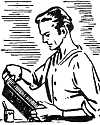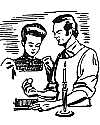 He started out as a newsboy and later, at the age of seventeen, he was
apprenticed to a bookbinder and stationer. His education had been very
limited - just a little reading, writing and arithmetic, but in his new
job he found the time to read and learn about many new things. His
attention was drawn to an article about electricity in the
Encyclopaedia Britannica which he was binding. He became so interested
in the accounts of the experiments that he tried to save up enough
money to do them himself.
He started out as a newsboy and later, at the age of seventeen, he was
apprenticed to a bookbinder and stationer. His education had been very
limited - just a little reading, writing and arithmetic, but in his new
job he found the time to read and learn about many new things. His
attention was drawn to an article about electricity in the
Encyclopaedia Britannica which he was binding. He became so interested
in the accounts of the experiments that he tried to save up enough
money to do them himself.In his search for knowledge, Faraday was fortunate enough to attend some of Sir Humphrey Davy's lectures on science at the Royal Institution. Davy's lectures interested Faraday so much that he took down complete notes, a copy of which he later bound and sent Sir Humphrey. Davy, after reading the notes, offered young Faraday a position as laboratory assistant at a salary of about $10.00 per week. Nothing could have been more fortunate than this connection with Sir Humphrey Davy for here was the beginning of an epoch of experimental science.  At this time, the principles of electricity were just being
discovered. On Christmas Day, in 1821, while he was showing an
experiment to his wife, Faraday got the idea that turned out to be the
basic principle of all electric generators and motors. It took months
of experimenting before he could prove that the principle was correct.
At this time, the principles of electricity were just being
discovered. On Christmas Day, in 1821, while he was showing an
experiment to his wife, Faraday got the idea that turned out to be the
basic principle of all electric generators and motors. It took months
of experimenting before he could prove that the principle was correct. |








